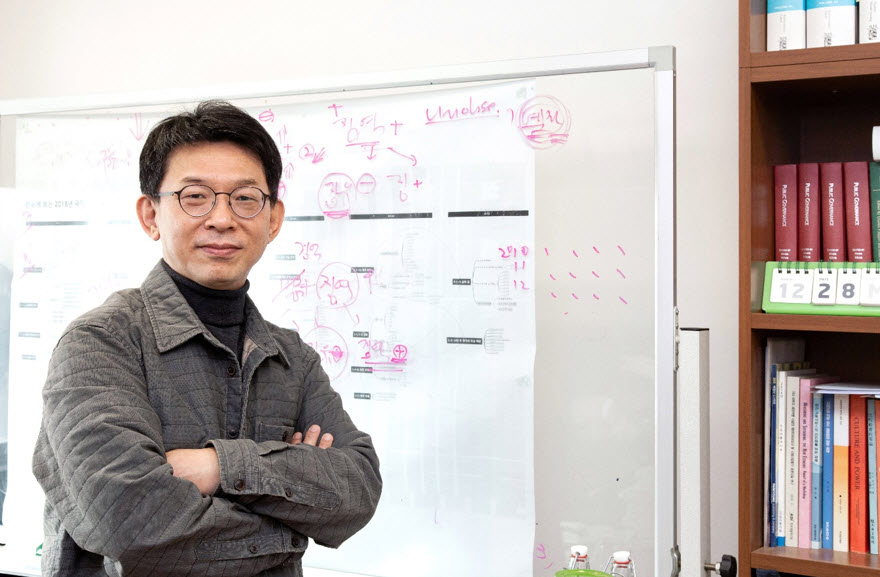Professor Hyunsub Kum of the Graduate School of Public Administration teaches the methodology course mandatory for all students of the school. His efforts to enhance the quality of the curriculum and strengthen students’ fundamental competence are highly regarded, and he has built educational models linking theory and practice. He is known for advising the largest number of students among the faculty of the school and for instilling the researcher’s spirit within his students.
To commemorate his achievement, the English Editors team reached out to him to learn more about his research and teaching philosophy. The following is an edited transcript of the interview.

Professor Hyunsub Kum(Graduate School of Public Administration)
Congratulations on receiving the 2020 Excellence in Teaching Award! Any thoughts you would like to share?
I’m very thankful. At the same time, I’m not sure I deserve the award. I will take it as encouragement to do better in the future. Education, research, and making contributions to society are all responsibilities I have as a professor. Among these, I prioritize education. I was only trying to make a positive impact within my field, and am humbled to receive such acknowledgement.
As Head of the Center for Survey Research and director of the Global Master of Public Administration, what is the focus of your research at the moment?
The study of public administration and policy belongs very much to the practical domain. I don’t mean to downplay its academic significance, but inherently it should be able to assess and provide solutions to present issues. In order to do that, we collaborate with various fields in the social sciences. This is not limited to the academic sphere; we also take into consideration the opinions of the general public. The aim of the Center for Survey Research is to facilitate communication between researchers and the public. We are currently busy creating a questionnaire that can accurately represent the Korean populace. First we have to decide on appropriate samples to represent the populations whose behavior we want to predict. After that, we must ensure that replies from respondents are generally honest. As the term “shy Trump voters” in connection with the recent US presidential elections suggests, bringing forth honest replies from respondents is a major challenge in conducting public opinion polls. Many other factors can serve as obstacles to this process, so creating this questionnaire is my main focus these days.
You are in charge of the methodology course that is mandatory for all students of the Graduate School of Public Administration. Your educational models for linking theory and practice are also highly praised among students. Could you briefly introduce the methodology course you teach, and how this practical education model is devised?
GSPA gives students the freedom to choose their own focus of study. We do, however, require them to take two mandatory courses that will encourage data-driven thinking. One of them is Research Methods for Public Administration and Policy (조사방법론), that covers basic methods of carrying out academic research in this area. The other is Quantitative Analysis for Public Administration and Policy (계량분석). Quantitative Analysis actually consists of two courses: basic and advanced. As you might think when you first hear the name, methodology is intimidating for new students. My goal is to make it more approachable in two ways.
First, when making the course text, I assemble materials from as large a variety of sources as possible . Methodology itself is a very rules-oriented discipline, and there are numerous textbooks that offer theoretical frameworks. The true value of methodology, however, lies in understanding how the principles work in dynamic situations. That is why in class, I try to provide real examples, and emphasize the role of the researcher in making methodological decisions on the spot.
Second, I encourage discussion and interaction among students. This process allows students to verify their own knowledge and either reinforce or correct their understanding of a principle or situation. There is also the problem of deriving different conclusions from the same data. Ten people will come up with ten different interpretations, because all data are subjective and limited. Although I cannot cover every one of these crucial aspects in my courses, students will certainly encounter these types of situations during the course of their careers. Through active discussion I hope to create a learning environment where students can fully engage and come away with more than what is covered in lecture.
Is there any advice you would like to give to SNU students?
I wish students would be less hesitant about taking new challenges. SNU students are held to high standards, and I believe those expectations can be met only by stepping out of your comfort zone. There are many opportunities available around you, so don’t be afraid to try everything you can. Even experiences that may seem irrelevant in the moment might prove to be useful in the long term. I would also like it if students would reach out to professors more. The relationship should not be as formal and distant as it has tended to have been; building a strong rapport with a professor can aid you in many ways. In my case, students consult with me about all sorts of problems but they are able to find solutions on their own without my having to say anything. I am happy to be of help in any way, and my fellow professors share the same view. Please remember that we are always here to offer whatever assistance we can.
Written by Hyunjoo Lee, SNU English Editor, legohj1001@snu.ac.kr
Reviewed by Professor Travis Smith, Department of Asian Languages and Civilizations, tlsmith@snu.ac.kr

